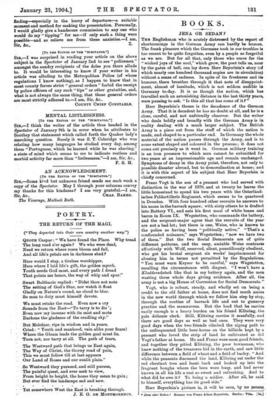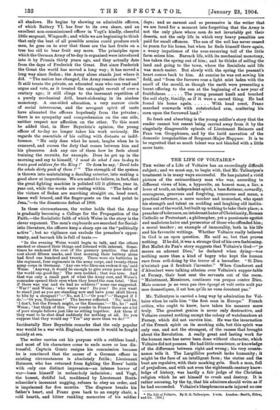JENA OR SEDAN ?
THE Englishman who is acutely distressed by the report of shortcomings in the German Army can hardly be human. The frank pleasure which the Germans took in our troubles is too recent to be quite forgotten, even by a people so forgetful as we are. But for all that, only those who crave for the "wicked joys of the soul," which grow, the poet tells us, near by the gates of hell, can lay down Herr Beyerlein's story (of which nearly one hundred thousand copies are in circulation) without a sense of sadness. In spite of its freshness and its humour, there breathes through it that note of disappoint- ment, almost of lassitude, which is not seldom audible in Germany to-day. It is as though the nation, which has travelled such an astonishing distance in the last thirty years, were pausing to ask, "Is this all that has come of it?"
Herr Beyerlein's theme is the decadence of the German Army. That it is decadent he has no doubt at all, and he is a close, careful, and not unfriendly observer. But the writer who deals boldly and broadly with the German Army is in reality dealing with a much larger subject. The British Army is a piece cut from the stuff of which the nation is made, and shaped to a particular end. In Germany the whole material of the nation passes through the Army, and is to some extent shaped and coloured in the process ; it does not come out precisely as it went in. German military training is an iron pressure to which men cannot be submitted for two years at an impressionable age and remain unchanged. Symptoms of decay in the Army point, therefore, not only to possible disaster abroad, but to demoralisation at home; and it is with this aspect of his subject that Herr Beyerlein is chiefly concerned.
Franz Vogt is the son of a peasant who had served with distinction in the war of 1870, and at twenty he leaves the little homestead to spend his two years with the Osterland- isches Feldartillerie Regiment, which seems to be quartered in Dresden. With four hundred other recruits he answers to his name in the barrack square; with sixty others he is drafted into Battery VI., and eats his first meal of white beans and bacon in Room IX. Wegstetten, who commands the battery, and the sergeant-major agree that the recruits of the year are not a bad lot; but there is one, Weise, who is known to the police as having been "politically active." "That's a confounded nuisance," says Wegstetten; "now we have two of them." But the two Social Democrats are of quite different patterns, and the easy, amiable Weise contrasts effectively with Wolf, reserved, silent, punctiliously obedient, who got his brutal sergeant six weeks' imprisonment for abusing him in terms not permitted by the Regulations. "You must warn Keyser to be careful," says Wegstetten, recalling the circumstance with disgust. "I won't have a Kladd,eradatsch like that in my battery again, and the men wasting three whole days giving evidence. After all, the army is not a big House of Correction for Social Democrats."
Vogt, who is robust, steady, and wholly set on being a credit to the old father at home, does not find much amiss in the new world through which we follow him step by Step, through the routine of barrack life and out to gunnery practice and the manceuvres. But the load that he carries easily enough is a heavy burden on his friend Klitzing, the pale delicate clerk. Still, Klitzing carries it manfully, and there are good days as well as bad ones. They were very good days when the two friends climbed the zigzag path to the unfrequented little beer-house on the hillside kept by a peasant who loved the strip of land he cultivated as did Vogt's father at home. He and Franz were soon good friends, and together they pitied Klitzing, the poor townsman, who knew nothing of the treasures hid in the earth, and saw little difference between a field of wheat and a field of barley. "And while the peasants discussed the land, Klitzing sat under the red chestnut tree and leant back and looked up into the fragrant boughs where the bees were busy, and had never known in all his life a rest so sweet and refreshing. And to what did he owe it ? To being a soldier. After all, he said to himself, everything has its good side."
Herr Beyerlein's picture is, it will be seen, by no means
• Jena oder Sedan? Roman von Franz Adam Beyerlein. Berlin: Vita. [34.] excellent non-commissioned officer in Vogt's kindly, cheerful little sergeant, Wiegandt ; and while we are beginning to think that only the best of all possible armies could produce such men, he goes on to aver that these are the last fruits on a tree too old to bear fruit any more. The principles upon which the German Army of to-day is organised were introduced into it by Prussia thirty years ago, and they actually date from the days of Frederick the Great But since Frederick the Great the world has moved a long way ; it has moved a long way since Sedan ; the Army alone stands just where it did. "The nation has changed, the Army remains the same." It still treats the private, an educated man who can read and argue and vote, as it treated the untaught recruit of over a century ago ; it still clings to the incessant repetition of a purely mechanical drill, heart-sickening in its aimless monotony. A one-sided education, a very narrow circle of social intercourse, and the arrogant spirit of caste have alienated the officers hopelessly from the privates ; there is no sympathy and comprehension on the one side, neither respect nor affection on the other. To this must be added that, in Herr Beyerlein's opinion, the young officer of to-day no longer takes his work seriously. He regards the essentials of his calling with distaste or indif- ference. "He only does what he must, laughs when he is censured, and curses the duty that comes between him and his pleasures. Ask any one of them how he feels about training the recruits, for example. Does he get up in the
morning and say to himself, 'I must do what I can to-day to train good soldiers for the King ?' Or does he say, 'Devil take the whole dirty pack of them ?' " The strength of the system is thrown into maintaining a dazzling exterior, into making a good show at inspections. We are asked to believe, in fact, that the great fighting machine is polished till it glitters, year in, year out, while the works are rusting within. "The heirs of
the victors of Sedan are marching straight on, head erect, knees well braced, and the finger-posts on the road point to Jena,"—to the disastrous defeat of 1806.
In these circumstances, the writer holds that the Army is gradually becoming a College for the Propagation of the Faith,—the Socialistic faith of which Weise in the story is the clever exponent. The men's cupboards are searched for Social- istic literature, the officers keep a sharp eye on the "politically active " ; but no vigilance can exclude the preacher's oppor- tunity, and barrack life is full of texts :—
" In the evening Weise would begin to talk, and the others smoked or cleaned their things and listened with interest. Some- times he reckoned the cost of the gunnery practice. One shot cost about fifteen marks, and that morning their battery alone had fired one hundred and twenty. There were six batteries in the regiment, four regiments in the army corps, and twenty-three army corps in Germany. Any one who likes can reckon it up,' said Weise. 'Anyway, it would be enough to give every poor devil in the world one good day.' The men nodded ; that was true. And that was only a small part of what the Army cost, and Weise's comrades opened their eyes when they heard the sum total. But if there was war and we had no soldiers ?' some one suggested. War ? ' said Weiss; who wants war? Do you? Do you want to stand just as you are standing now and have your skull blown
to bits by a shrapnel? No, not Or you ? Hanged if I do.'—' Or you, Truchsess ? ' The brewer reflected. No,' said be, I don't, but the French might, or the Russians.'—' Ho, ho !' said Weiss; but think of this. Over yonder in France there are a lot of poor simple fellows just like us sitting together. Ask them if they want to be shot dead suddenly for nothing at all. Do you suppose that they would say "Yes" any more than we do ? "
Incidentally Herr Beyerlein remarks that the only popular war would be a war with England, because it would be fought mainly at sea.
The writer carries out his purpose with a ruthless hand; and most of his characters come to ends more or less dis- tressful Captain Guntz resigns his commission because he is convinced that the career of a German officer in existing circumstances is absolutely futile ; Lieutenant Reimers, who has returned from fighting the Boers' battle with only one distinct impression—an intense horror of war—loses himself in melancholy indecision ; and Vogt, the honest, dutiful lad, maddened by Lieutenant Brett" schneider's incessant nagging, refuses to obey an order, and is imprisoned for five months. The disgrace breaks his father's heart, and Franz goes back to an empty chair, a cold hearth, and bitter rankling memories of his soldier days ; and so earnest and so persuasive is the writer that we are lured for a moment into forgetting that the Army is not the only place where men do not invariably get their deserts, not the only life in which very heavy penalties are paid for small offences. The son of the soil has never ceased to yearn for his home, but when he finds himself there again, a weary impatience of the ever-recurring toil of the little farm seizes him. Barrack life, with its mechanical monotony, has taken the spring out of him ; and he thinks of selling the land and going to the town, where the Socialists said life was much easier. But slowly with the spring the peasant's heart comes back to him. At sunrise he was out sowing his field, and "from the furrows rose a light mist laden with the smell of the mould, as though the earth were presenting a burnt offering to the sun at the beginning of a new year of fruitfulness The young peasant knelt and touched the soil shyly, timidly, as if it were a sacred thing. He had found his home again With head erect, Franz marched sunwards with outstretched arm, scattering his corn upon the furrowed land."
So fresh and absorbing is the young soldier's story that the reader cannot but resent being carried away from it by the singularly disagreeable episode of Lieutenant Reimers and Frau von Gropphusen, and by the lurid narration of the domestic irregularities of Sergeant-Major Heppner. It is to be regretted that so much talent was not blended with a little more taste.
THE LIFE OF VOLTAIRE.*











































 Previous page
Previous page